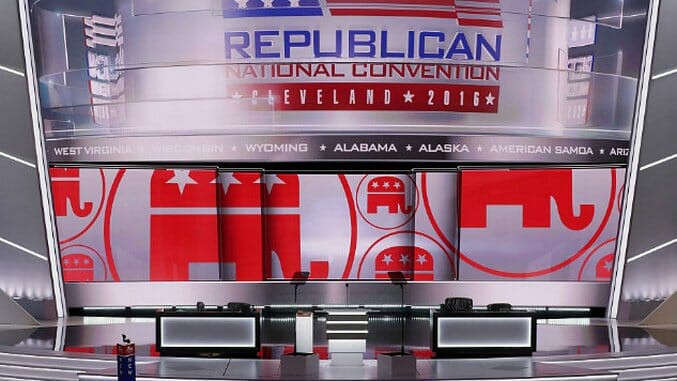Conventional Wisdom: How the RNC Rewrote the Script
Photo by Alex Wong/Getty
At a certain point in this week’s Republican National Convention, held at Cleveland’s Quicken Loans Arena (“The Q”), even those in possession of a practiced ear might’ve entertained the notion that words had lost their meaning. The particular moment this general aphasia set in is difficult, in retrospect, to pin down: Was it after ABC’s Jonathan Karl, interviewing Faustian figure Chris Christie on Tuesday night (“Make America Work Again”), described the New Jersey governor’s “indictment” of Hillary Clinton as “blistering” three times in succession? Was it once the Democratic Congressional Campaign Committee had recycled the subject line “Obama FUMING” in its seventeenth and eighteenth emails of the week? Was it Fox News Channel’s Stuart Varney using the word “celebrity” to describe professional golfer Natalie Gulbis, a second-tier Baldwin brother, and forgotten Saturday Night Live cast member Joe Piscopo?
In a sense, though, the specifics were immaterial. It was the boundless swirl of inanities itself that defined much of the coverage of the RNC, which left the hosts, analysts, and political correspondents of one after another cable news panel unable to fit the square peg of events into the round hole of expectations. Long after the morning 13 months ago on which Donald J. Trump announced his candidacy, the press preferred to see his rise as a malfunction of political gravity, but in the course of four days in Cleveland it became clear that this hoary maxim had mistaken the symptom for the disease. By the time the balloons fell from the rafters Thursday night (“Make America Great Again”), the GOP had nominated a race-baiting authoritarian of so few merits that his main endorsements came from members of his own family, and no number of impassioned dissents to Trump’s acceptance speech managed to shake the impression that his dystopian vision for the country had already been assimilated under the rubric of “politics as usual.” When it came to Trumpism, conventional wisdom had ceded the field.
-

-

-

-

-

-

-

-

-

-

-

-

-

-

-

-

-

-

-

-

-

-

-

-

-

-

-

-

-

-

-

-

-

-

-

-

-

-

-

-








































